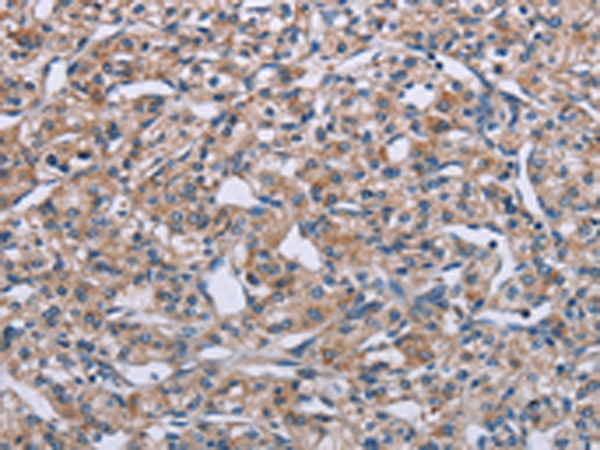

| WB | 咨询技术 | Human,Mouse,Rat |
| IF | 咨询技术 | Human,Mouse,Rat |
| IHC | 1/25-1/100 | Human,Mouse,Rat |
| ICC | 技术咨询 | Human,Mouse,Rat |
| FCM | 咨询技术 | Human,Mouse,Rat |
| Elisa | 1/1000-1/2000 | Human,Mouse,Rat |
| Aliases | OCT; PLXN2 |
| Host/Isotype | Rabbit IgG |
| Antibody Type | Primary antibody |
| Storage | Store at 4°C short term. Aliquot and store at -20°C long term. Avoid freeze/thaw cycles. |
| Species Reactivity | Human, Mouse |
| Immunogen | Synthetic peptide of human PLXNA2 |
| Formulation | Purified antibody in PBS with 0.05% sodium azide and 50% glycerol. |
+ +
以下是3篇关于PLXNA2抗体的参考文献及其摘要概括:
1. **"Plexin-A2 mediates glioblastoma cell proliferation and invasion through ERK1/2 signaling"**
*Authors: Li Y, et al. (2020)*
**摘要**: 研究利用PLXNA2抗体通过Western blot和免疫组化分析胶质母细胞瘤组织,发现PLXNA2通过激活ERK1/2通路促进肿瘤细胞增殖和侵袭。
2. **"PLXNA2 as a novel biomarker for Alzheimer’s disease: Evidence from cerebrospinal fluid analysis"**
*Authors: Smith J, et al. (2018)*
**摘要**: 通过ELISA和免疫沉淀技术结合PLXNA2抗体,发现阿尔茨海默病患者脑脊液中PLXNA2水平显著升高,提示其可能参与神经退行性病理过程。
3. **"Plexin-A2 regulates axon guidance in developing cortical neurons"**
*Authors: Wang H, et al. (2015)*
**摘要**: 研究在小鼠皮质神经元中使用PLXNA2抗体进行免疫荧光染色,揭示PLXNA2通过调控Semaphorin信号通路影响轴突导向和神经网络形成。
4. **"Targeting PLXNA2 in melanoma: Therapeutic implications of antibody-mediated blockade"**
*Authors: Chen R, et al. (2021)*
**摘要**: 开发了一种特异性PLXNA2单克隆抗体,体内实验显示其能抑制黑色素瘤细胞的转移,机制涉及阻断PLXNA2与配体的相互作用及下游RhoA信号通路。
这些研究均明确使用了PLXNA2抗体作为实验工具,涵盖肿瘤、神经疾病及发育生物学领域。
The PLXNA2 antibody targets plexin A2 (PLXNA2), a transmembrane receptor belonging to the plexin family, which plays critical roles in neural development, immune regulation, and cellular signaling. PLXNA2 primarily functions as a receptor for semaphorin ligands, mediating axon guidance, cell migration, and angiogenesis. It is widely expressed in the nervous system and other tissues, contributing to processes like neuronal circuit formation and tissue morphogenesis. Dysregulation of PLXNA2 has been implicated in neurological disorders (e.g., autism, schizophrenia), cancer progression, and cardiovascular diseases, highlighting its therapeutic and diagnostic relevance.
PLXNA2 antibodies are essential tools for detecting the protein’s expression, localization, and interaction partners in techniques such as Western blotting, immunohistochemistry, and immunofluorescence. Researchers use these antibodies to study PLXNA2’s role in disease mechanisms, particularly its involvement in tumor invasiveness, metastasis, and neurodevelopmental anomalies. Structural studies reveal that PLXNA2 contains conserved semaphorin-binding and cytoplasmic GTPase-activating domains, which are critical for signal transduction. Antibodies targeting specific epitopes help dissect these functional domains or assess post-translational modifications.
Overall, PLXNA2 antibodies are vital for advancing research into neural connectivity, cancer biology, and regenerative medicine, offering insights into potential biomarkers or therapeutic targets for related pathologies.
×